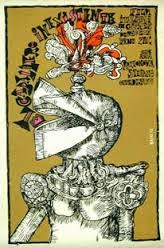In these days, when so many truths are coming to light, but when accountability does not come as a consequence so clearly or strongly, the memory of my favourite book comes back every time. My favourite book is not a big romantic drama or a deep Russian novel. The book that I was dreading to end, when I read it, maybe 20 years ago is Italo Calvino's The nonexistent knight. I remember turning each page with a mixture of eagerness and regret of leaving each page behind. I have to read it again.
Let me explain why I think of this book, when I read about the US Senate report of torture. There are a few passages that come to mind: one is the very beginning when Charlemagne was reviewing his paladins shortly before going to battle. He goes through them one by one, asking who they were, where they came from, who were their parents. Until he reaches the last of these knights. A knight in a bright, clean, unscratched white armour. After presenting himself, Charlemagne asked him to raise his visor and show his face. But the knight wouldn't do it. Charlemagne asked why. He responded "Sire, because I do not exist". He then revealed that the helmet was in fact empty. "How do you do your job, then, if you don't exist?" asked Charlemagne. "By will power and faith in our holy cause", Agilulf, the non existent knight replied. He was the model soldier, a bureaucrat that followed all the rules and procedures to the point and was always right. No one liked him. It came to be when a name, a rank, some duties and a story somehow condensed into an armour.
It is indeed difficult to face our shadow, particularly when we have spent years projecting it to others and pointing our fingers at them. So difficult it is, that we create a carefully crafted narrative that swirls around the unspeakable truth. The words of the President of the committee were somehow of a higher consciousness "Torture goes against the very soul of our country" and relating the greatness of the country with the ability to face these facts. The reaction of the republican Senator John McCain, victim of torture himself, was probably the most poignant when he said "enhanced interrogation methods stained our national honor". However accountability is still not on the table. Some empty armors did it. And Americans seem to be ok with this. If one piece of news was US admitting what everyone knew they were doing, the second piece of news is that it did not cause any major reaction.
The second passage of the book that comes to mind is when Charlemagne was warning Torrismund that due to the fact that he was born out of wedlock, he would lose his rank. He should get his father to recognise him. "I can never be recognised", 'My father was no man". Charlemagne asked "Who then?". Torrismund replies "'Tis the Sacred Order of the Knights of the Holy Grail". Then he told the story of how his mother met the knights and spent a lot of time with them, until she became pregnant. Charlemagne saw the problem: "The Knights of the Holy Grail have all made a vow of chastity and none of them can ever recognise you as son". Torrismund then explained "My mother has never spoken about any knight in particular, but brought me up to respect as a father the Sacred Order as a whole". Charlemagne then suggested "The Order as a whole is not bound by any vow of the kind. Nothing therefore prevents it from being recognized as a person's father". No one has fathered him. It was the Order. The Order did it.
In this case, the CIA did it. Or the Bush Administration did it. And Obama's. Or the US did it. Let's turn the page. Never again. Let's look forward. We are awesome.
But how can we avoid it to happen again if we do not explore the existence of these empty armours and the functioning of these Orders? If we do not truly look at them? If they do not look at themselves? Can empty armours and faceless Orders truly "see" other people as people?
ABIn this case, the CIA did it. Or the Bush Administration did it. And Obama's. Or the US did it. Let's turn the page. Never again. Let's look forward. We are awesome.
But how can we avoid it to happen again if we do not explore the existence of these empty armours and the functioning of these Orders? If we do not truly look at them? If they do not look at themselves? Can empty armours and faceless Orders truly "see" other people as people?










